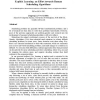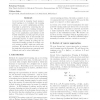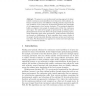178 search results - page 3 / 36 » Can Learning in the Limit Be Done Efficiently |
CORR
2008
Springer
13 years 5 months ago
2008
Springer
Scheduling problems are generally NP-hard combinatorial problems, and a lot of research has been done to solve these problems heuristically. However, most of the previous approach...
CVPR
2005
IEEE
14 years 7 months ago
2005
IEEE
Our objective is to model the visual manifold of object appearance corresponding to geometric transformation. We learn a generative model for object appearance where the appearanc...
ICML
2009
IEEE
14 years 6 months ago
2009
IEEE
Recent advances in Multiple Kernel Learning (MKL) have positioned it as an attractive tool for tackling many supervised learning tasks. The development of efficient gradient desce...
ICML
2008
IEEE
14 years 6 months ago
2008
IEEE
A recent trend in exemplar based unsupervised learning is to formulate the learning problem as a convex optimization problem. Convexity is achieved by restricting the set of possi...
ECML
2007
Springer
13 years 9 months ago
2007
Springer
Abstract. We present a new reinforcement learning approach for deterministic continuous control problems in environments with unknown, arbitrary reward functions. The difficulty of...



